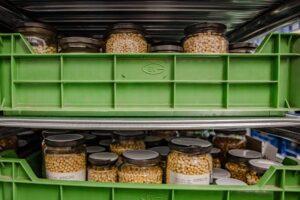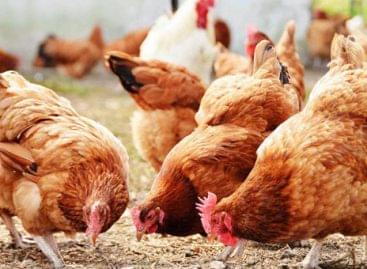A new building ensuring long-term gene preservation was handed over in Tápiószele
Maintaining the diversity of genetic resources, especially with regard to crops for agricultural and food purposes, is an important issue of food security and national strategy.In the new building of the National Center for Biodiversity and Gene Conservation (NBGK), which was handed over on Wednesday, two deep-freezing chambers were installed, which, after proper preparation, can store the seed samples stored there for 100 years.

(Photo: AM/Tibor Vermes)
Our country’s largest plant gene bank, as part of the National Center for Biodiversity and Gene Conservation, has been operating in Tápiószélé for more than 65 years, and is now ranked among the top twenty gene conservation centers in the world. 50% of all domestic plant genetic resources are located here, and it is the only one in the country to carry out full-scale gene bank activities, its primary basic task being “gene preservation, variety protection”. The new building, built for almost one billion forints, will perform its tasks in the future using the most modern technologies.
The building has 1 temporary storage, 3 seed drying chambers, and two cold storages, which ensure the long-term preservation of seeds at ̶ 20 degrees Celsius
A total of 2,440 chests can be placed in the chambers, which in the coming approx. It is a solution to your storage tasks for 20 years, and can help with the logistical problems of existing samples stored in chambers awaiting renovation. In addition to these, the building housed the viability laboratory, the offices of colleagues providing gene bank administration, and rooms supporting professional work.
The NBGK not only stores its own seed collection, but also provides national coordination in the field of plant gene conservation
NBGK operates the National Database Repository, which preserves the seed bank collections of other domestic gene banks as backup duplicates. The new gene bank provides future generations with the plant genetic resources that form the basis of domestic GMO-free agriculture, developed in the Carpathian Basin over the past several thousand years, thereby helping to lay the foundation for domestic food security. The maintenance of the diversity of plant genetic resources, especially for agricultural and food crops, has recently become a worldwide problem. The Basic Law of Hungary specifically provides for the protection of natural resources, especially farmland, forests and water resources, biological diversity, native plant and animal species, and cultural values, which constitute the common heritage of the nation. Their maintenance and preservation for future generations is not only the duty of the state, but of everyone.
AM
Related news
The EP accepted the safeguard clauses concerning the Mercosur agreement
🎧 Hallgasd a cikket: Lejátszás Szünet Folytatás Leállítás Nyelv: Auto…
Read more >AM: Ministry of Agriculture supports the replacement of plantations damaged by frost
🎧 Hallgasd a cikket: Lejátszás Szünet Folytatás Leállítás Nyelv: Auto…
Read more >Related news
How to spend Valentine’s Day around here
🎧 Hallgasd a cikket: Lejátszás Szünet Folytatás Leállítás Nyelv: Auto…
Read more >PwC Consumer Loyalty Survey now available for pre-order
🎧 Hallgasd a cikket: Lejátszás Szünet Folytatás Leállítás Nyelv: Auto…
Read more >







